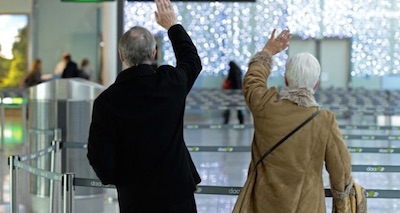
By Caoilfhionn Ni Dhonnabhain (for sluggerotoole.com)
In 1967, eight years before Enda Kenny entered the Dail, another Mayo native John Healy wrote his book ‘No One Shouted Stop - Death of an Irish Town’ chronicling the devastating impact of emigration on the town of Charlestown, County Mayo. As the title suggests the book focused on the failure to act and the complacency that characterised the official response to emigration.
As we enter Enda Kenny’s 40th year in the Dail there is deep disappointment that the Taoiseach who grew up in a Mayo ravaged by emigration has not grasped the historic opportunity to end the disenfranchisement of Ireland’s emigrants.
The Irish state, unlike over 120 countries worldwide and most European states, does not allow its citizens living abroad to vote.
The Constitutional Convention established by the current government recommended a referendum be held on this issue.
However despite a growing demand for action the Taoiseach has made clear that a referendum on votes for emigrants will not take place in the lifetime of this government and that this is an issue for the next government.
Rather the government has chosen to put to the people a referendum on an issue for which there is no demand or urgency - reducing the age of eligibility for candidates for the Presidency of Ireland to 21.
The fact is that the disenfranchisement of Irish emigrants is tied up with the attitude of successive governments to the question of emigration.
The failure to curb emigration is one of the greatest failures of the Irish state and while its causes have been complex at times, the failure to act has been stark. We have long been happy to take the remittances of emigrants but unwilling to extend to them the full rights of citizenship.
There is always an excuse to avoid pointing to the fact that at the core of the emigration problem is a government failure, a political failure with serious long term social and economic costs.
That failure to tackle emigration, to recognise its consequences and to deal with the issue of emigrants votes has its roots in the conservative nature of the Irish state and the interest of that class that had established itself after partition.
Emigration was seen as a safety valve for a radicalism that might have threatened their interests - and it still is today. That is why voting rights will not easily be given to or won by Irish emigrants.
Those who sought to maintain the status quo, to preserve the conservative state saw emigration as a way of ensuring the social pressure for change did not build up.
In his contribution to the 1950’s ‘Commission on Emigration and Other Population Problems’ Alexis Fitzgerald who would later become a Fine Gael senator and an advisor to Taoiseach Garrett Fitzgerald stated “I believe that there should be a more realistic appreciation of the advantages of emigration. High emigration, granted a population excess, releases social tensions which would otherwise explode and makes possible a stability of manners and custom which would otherwise be the subject of radical change”.
Fitzgerald was of that class that had established a position of dominance post partition. His views reflect what many who developed Government policy believed. The fact was emigration was a class issue.
In 1987 Brian Lenihan Senior commented on the high rates of emigration of the 1980’s dismissively saying that “we cannot all live on a small island”. These sentiments were echoed again by politicians in Fianna Fail and Fine Gael when emigration returned following the 2008 economic collapse.
Those children born in the year that Brian Lenihan Snr made his comments were the first generation to grow up with no sense that they would be forced to emigrate. The boom that started in the late 1990’s promised this generation a future in Ireland. They were also the first generation to grow up in an Ireland of immigration. They are amongst today’s generation of emigrants.
But they are also part of a new generation of emigrants fighting back - fighting to have a say in the future of their country through organisations such as ‘We’re Coming Back’ which are campaigning for voting rights for the Irish abroad.
The argument put forward by Irish governments for a failure to deliver on voting rights - that citizens abroad no longer have sufficient connections with their home country is laughable.
In fact as we know most Irish emigrants retain close connections with Ireland.
The current government claims it is committed to bringing Irish emigrants home. But if they are serious about bringing emigrants home then they need to firstly give them a stake in their country by giving them a vote.
90 years of complacency towards the question of Irish emigration and the plight of Irish emigrants was summed up in the lines of Cricklewood by John B Keane: “Leave him down in Cricklewood mid mortars bricks and lime, Let him rot in Cricklewood until the end of time.” This was effectively what Irish governments did for past generations of emigrants.
It’s time to drop the excuses, stop delaying and deliver on voting rights for Irish emigrants.
![[Irish Republican News]](https://republican-news.org/graphics/title_gifs/rn.gif)
![[Irish Republican News]](https://republican-news.org/graphics/title_gifs/harp.gif)

